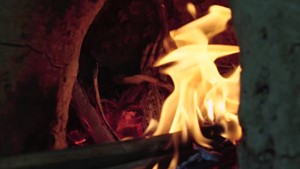A Cleaner World Blog
Preventing Spontaneous Combustion Fires in the Home and Workplace
You hear things – like a pile of rags, just lying there doing nothing, suddenly catching on fire – and think, “does stuff like that really happen?” Trust us, it really does. The cause is spontaneous combustion, and it happens when the temperature of something increases to the point where a chemical reaction occurs, causing the heat to quickly increase to a high enough temperature to cause ignition. According to the National Fire Prevention Association, 14,070 fires per year are caused by spontaneous combustion or chemical reaction.
What are the odds that something like this will happen in your home? Not terribly likely, but it’s good to be prudent, so here are a few tips to ensure this sort of thing doesn’t happen in your home or business.
- Rags or towels covered with oils, including cooking oils, and stain should be spread out on a non-flammable surface (weighted down so they don’t blow away) away from buildings or structures. Once dry, store them in an air-tight, non-combustible metal container or check with local municipalities or industrial cleaning companies to follow proper disposal methods or arrange for pick up.
- Rags or towels covered in petroleum-based oil or gasoline should also be dried using the above method, and again check with local municipalities or industrial cleaning companies for disposal instructions or arrange for pick up. Never place any petroleum stained cloth in a dryer, even after washing.
- If you are working on an on-going project where soiled rags will be reused, then place them in a single layer on concrete or rock, out of the sun, and allow them to dry. Never place them in a large pile.
- Never leave hot laundry in piles; either address it immediately or lay the pieces out flat on a non-flammable surface.
- Store hay, compost, mulch, manure, and leaves away from buildings, and in the case of hay, be sure it is completely dry before bailing and storing away.
- Put smoke alarms inside and outside of each bedroom and sleeping area and on every level of your home, and be sure they are inter-connected. Check smoke detectors at least once a month and change batteries at least twice a year.
- Finally, always have at least one fire extinguisher, in good working order, in your home and know how to use it. It is ideal to have one on every floor of your home as well as in your garage, and if you own a barn or out building, place one there as well.
If you are uncertain, it is always best to err on the side of caution. We are always available for questions and to help point you in the right direction.



